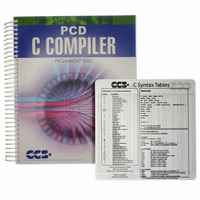PCDIDE COMPILER Custom Computer Services Inc (CCS), PCDIDE COMPILER Datasheet - Page 359

PCDIDE COMPILER
Manufacturer Part Number
PCDIDE COMPILER
Description
PCD C-COMPILER PIC24, DSPIC
Manufacturer
Custom Computer Services Inc (CCS)
Type
Compilerr
Datasheet
1.PCD_COMMAND_LINE_COMPILER.pdf
(373 pages)
Specifications of PCDIDE COMPILER
For Use With/related Products
Microchip PIC24/dsPIC®
Lead Free Status / RoHS Status
Not applicable / Not applicable
Other names
429-1008
- Current page: 359 of 373
- Download datasheet (4Mb)
Why is the RS-232 not working right?
1. The PIC® is Sending Garbage Characters.
2. The PIC® is Receiving Garbage Characters.
3. Nothing is Being Sent.
A. Check the clock on the target for accuracy. Crystals are usually not a problem but RC
oscillators can cause trouble with RS-232. Make sure the #USE DELAY matches the actual
clock frequency.
B. Make sure the PC (or other host) has the correct baud and parity setting.
C. Check the level conversion. When using a driver/receiver chip, such as the MAX 232, do
not use INVERT when making direct connections with resistors and/or diodes. You probably
need the INVERT option in the #USE RS232.
D. Remember that PUTC(6) will send an ASCII 6 to the PC and this may not be a visible
character. PUTC('A') will output a visible character A.
A. Check all of the above.
A. Make sure that the tri-state registers are correct. The mode (standard, fast, fixed) used will
be whatever the mode is when the #USE RS232 is encountered. Staying with the default
STANDARD mode is safest.
B. Use the following main() for testing:
Check the XMIT pin for activity with a logic probe, scope or whatever you can. If you can look at it
with a scope, check the bit time (it should be 1/BAUD). Check again after the level converter.
main() {
}
while(TRUE)
putc('U');
345
Related parts for PCDIDE COMPILER
Image
Part Number
Description
Manufacturer
Datasheet
Request
R

Part Number:
Description:
PROTOTYPING BOARD FOR PIC MCU
Manufacturer:
Custom Computer Services Inc (CCS)

Part Number:
Description:
Extra CCS C Manual
Manufacturer:
Custom Computer Services Inc (CCS)

Part Number:
Description:
MACH X Programmer
Manufacturer:
Custom Computer Services Inc (CCS)

Part Number:
Description:
PCD For 24-bit (PIC24/dsPIC)
Manufacturer:
Custom Computer Services Inc (CCS)

Part Number:
Description:
LOAD-n-GO Programmer
Manufacturer:
Custom Computer Services Inc (CCS)

Part Number:
Description:
EMBEDDED INTERNET DEVELOPMENT KIT W/PCWH
Manufacturer:
Custom Computer Services Inc (CCS)

Part Number:
Description:
PIC24F Development Kit With PCWHD
Manufacturer:
Custom Computer Services Inc (CCS)

Part Number:
Description:
PIC24F Development Kit With PCDIDE
Manufacturer:
Custom Computer Services Inc (CCS)

Part Number:
Description:
PIC24H Development Kit With PCWHD
Manufacturer:
Custom Computer Services Inc (CCS)

Part Number:
Description:
USB Master Prototyping Board
Manufacturer:
Custom Computer Services Inc (CCS)










